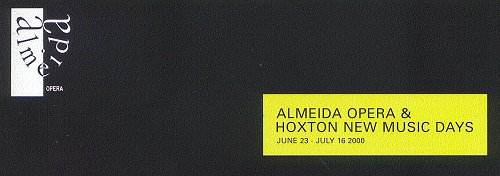The Almeida Opera and Hoxton New Music Days (London's summer festival of contemporary music and music theatre) continues until July 16 and has expanded into the Union Chapel and the Gainsborough Studios - an adventurous series of events, well worth supporting.Two concerts this week each featured a distinguished solo soprano. On her own unaccompanied, and with members of the Endymion Ensemble, Sarah Leonard gave impressive performances of works by Knussen, Kurtag, Andrew Hamilton and Birtwistle. Her voice seems to have darkened and become richer in quality, but she still ascends into the stratosphere confidently.
Oliver Knussen's Rilke settings epitomised one of the dilemmas of today's concert-giving. Presumably to try to make it more of a theatrical event in this attractively refurbished, though still spartan, former Victorian Musical Hall, lights were out and the spangled Sarah was spotlit in splendid isolation. This meant that one could only pick up odd words and was left with no possibility to ponder and try to comprehend the poems, which had been dutifully supplied on the night (with translations) in a programme insert! For her other unaccompanied set, selections from tiny epigrams set by Kurtag, Sarah Leonard helped the audience by reading to us in English those she had chosen. But they were so diminutive, often just one line, that continuity (axiomatic for a proper effect) was broken by having them each read, and then sung from the score, with a lot of page turning; well worth memorising and repeating! Andrew Hamilton's soprano + horn = (don't they love trendy titles?) is built on a very short text by Jasper Johns and demonstrated that the duo combination of voice and horn is very viable.
There were several miniature instrumental items played by members of Endymion, dressed casually, which is appropriate for this sort of concert. With gaps for platform re-arrangements, such sequences can make a concert rather bitty, so a major work of Birtwistle to finish was very welcome. The revival of Monody for Corpus Christi (1959), with settings of an old English carol and a sixteenth-century devotional poem, everything built from a single line (monody) with 'all the other parts embellishments from which they may be said to stem', came up fresh forty years on.
The other concert was given by Mary Wiegold and an ensemble of eight cellos conducted by John Carewe, who dedicated it to Sir William Glock, who had recently died, reminding us how he had turned around the post-war British music scene.
Birtwistle's new Niedecker songs for soprano and cello, sounding very beautiful at their premiere, posed the same problem of incomprehensibility again - with no texts provided; one got occasional individual words and phrases from the American text, but nothing really of what had prompted Birtwistle to set them.
The main feature of this important concert was music for seven or eight cellos played by an ensemble of leading London contemporary music cellists, looking and sounding splendid arranged in a semicircle on stage.
Berio's Korot (1998)exploited the richness of sonority available and also some characteristic 'roughening' of the sound. And deeply Sleeps ... by this year's featured composer, Per Nørgård, superimposed psalm-like melodic material at different speeds to striking evocative effect. Saariaho's Neiges (1998) exploits textures and ideas of symmetry and repetition, different pizzicati and superimposed ostinate. A very beautiful and important work for a medium that has long since proved its worth internationally through the work of the Amsterdam-based Cello Octet Conjunto Iberico, but has not yet made its mark in UK [see S&H's review September 1999 of their appearance at the Strasbourg Musica '99 Festival]. Messagesquisse by Boulez (1970, for Sacher's 70th birthday) features a soloist and, after a preponderance of slow music during the concert, brought the proceedings to an exciting conclusion [recorded by Cello Octet Conjunto Iberico, with Windungen by Xenakis, etc on Channel Classics CCS 11798].
This was an auspicious concert and it is to be hoped that a regular British eight-cello ensemble may be formed; there is a huge repertoire for it waiting to be explored.
The festival continues with a Nørgård day at Hoxton Hall Saturday 8 July (3 p.m onwards) and his opera Nuit des Hommes at the Almeida Theatre 12, 13 & 15 July.
Peter Grahame Woolf

 Return to:
Return to: